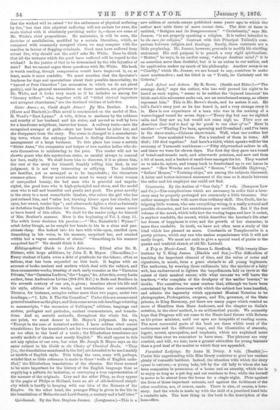Sister Anna ; or, Could Aught Atone? 3y Mrs. Honker.
3 vols. (Hurst and Blackett.)—This novel is constructed on the model of Mrs. H. Wood's "East Lynne." A wife, driven to madness by the coldness and cruelty of her husband and his sister, and moved as well by love for a handsome neighbour, leaves her home. A railway train—now the recognised avenger of guilt—slays her lover before he joins her, and she disappears from the story. The scene is changed to a manufactur- ing town, where the unhappy husband is finding distraction in the management of a large business. To this place has come a certain "Sister Anna," the companion and helper of two maiden ladies who de- vote themselves to ministering to the poor. The reader will not be slowsto guess who this mysterious sister, so careful always to conceal her face, really is. We shall leave him to discover, if it so please him, the rest of the story for himself, frankly telling him that, in our judgment, it is not very interesting or edifying. The incidents are familiar, yet so arranged as to be improbable ; the characters common-place. Every novel-reader must be weary of these women of unequalled beauty, the bad man who is graceful and unprin- cipled, the good hero who is high-principled and stern, and the model man who is tall and beautiful and gentle and good. The great novelty in the story is a most remarkable Quaker, who seizes the girl who has just refused him, and "rains hot, burning kisses upon her cheeks, her eyes, her sweet, tender lips"; and afterwards fights a rival UB furiously as Acheloos fought Hercules for Deianra. The Society seems never to have heard of this affair. We shall lot the reader judge for himself of Mrs. Boulter's manner. Here is the beginning of Vol. I. chap. 11. The wife's lover declares his passion :—" 'Mrs. Rainsforth ! Wynne ! ' cried Arley Gough, as he caught her hands in his in a close and pas- sionate clasp. She looked into his face with wide-open, startled eyes. Something in his voice, in his manner, surprised her, and created within her a vague sensation of alarm." "Something in his manner surpriired her !" We should think it did.


































 Previous page
Previous page